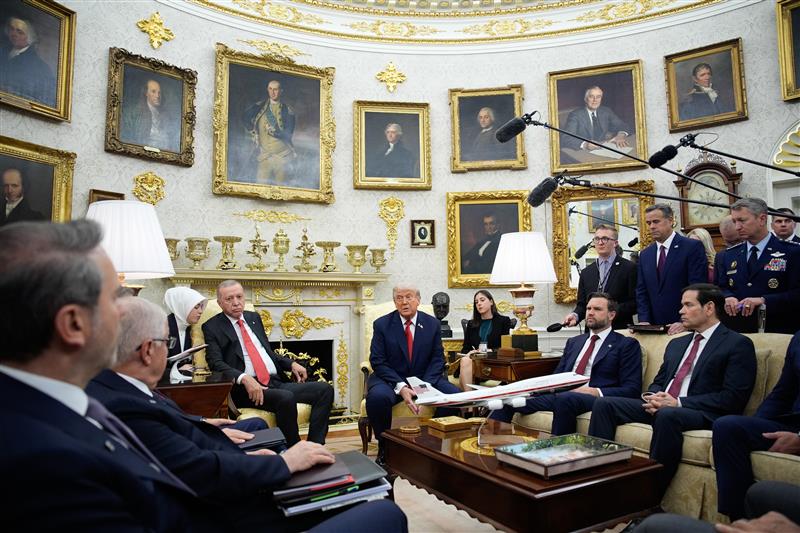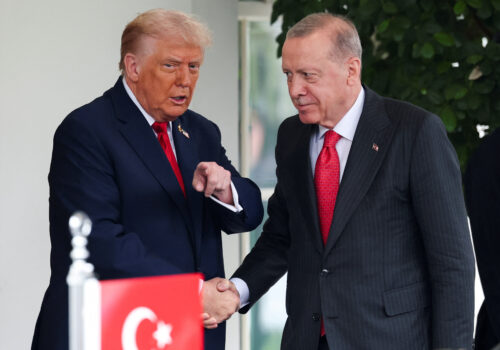When US President Donald Trump received Turkish President Recep Tayyip Erdoğan at the White House in late September, he repeated his request that Europe and NATO allies, including Turkey, end their energy trade with Russia. This shift in the Trump administration’s policy in a more pro-Ukraine and anti-Russia direction will have both positive and negative implications for Turkey.
In the long run, a weakened Russia and a Ukraine that succeeds in reclaiming as much of its occupied territory as possible is in line with Turkey’s interests, as it would reinforce Ankara’s strategic role in the Black Sea and the Mediterranean Sea. This would encourage both the United States and the European Union (EU) to include Turkey in bilateral and multilateral defense projects, as well as to supply Turkey with the military equipment it needs.
But in the short term, Turkey’s close energy cooperation with Russia presents a challenge. Trump’s demand that Europe and NATO allies end their energy trade with Russia, which he repeated both in his United Nations General Assembly (UNGA) opening speech and in front of the press with Erdoğan, is actually something that Turkey has been taking precautions about for a long time. However, Trump’s call to stop importing Russian oil comes as Washington and Ankara are expanding their energy cooperation. In the same week as the White House meeting, the United States and Turkey signed a Memorandum of Understanding on Strategic Civil Nuclear Cooperation and Turkey’s state-owned BOTAŞ signed a major agreement to import US liquefied natural gas (LNG). In addition to its agreements with US companies, Turkey has signed LNG deals totaling 15 billion cubic meters (bcm) with several global firms.
From now through 2028, Turkey could source up to 36 percent of the gas it imported from Russia in 2024 from new suppliers. This diversification is significant, as Turkey’s twenty-five-year, 16 bcm annual gas agreement with Russia is set to expire in 2026. This step will substantially weaken Russia’s position as a natural gas exporter to Turkey and increase Ankara’s bargaining power. However, in the near term, it does not seem likely that Turkey will completely end its energy relationship with Russia. Thus, the increasing energy and trade cooperation between Turkey and the United States should be read as both a furthering of Turkish-US bilateral relations and an effort to curb Russian influence.
With political leadership in Turkey and the United States doing the groundwork, companies from both countries can explore opportunities to cooperate in the South Caucasus, Iraq, Syria, and Libya, potentially contributing to prosperity and peace in these areas.
Turkey’s efforts to diversify its energy sources
Long before Russia’s full-scale invasion of Ukraine, Turkey realized that Russia wouldn’t hesitate to use energy as a weapon. It learned this lesson when Gazprom cut Turkey’s gas supply by 50 percent during the harsh winter of 2016 in retaliation for the downing of a Russian jet. In response, Turkey took steps to ensure its own energy security while contributing to that of Europe.
Turkey significantly diversified its energy sources and mix by increasing renewables and importing LNG, becoming the second-largest importer of US LNG in Europe in 2017. It also increased its gas storage capacity, ranking second in Europe in terms of LNG regasification capacity in 2024, with three floating storage regasification units and two LNG terminals.
Turkey has also diversified its pipelines, with the Trans-Anatolian Natural Gas Pipeline (TANAP) delivering Azerbaijani Shah Deniz gas to Turkey since 2018 and the Trans-Adriatic Pipeline (TAP), operational since 2020, carrying that gas to Europe. This solidified Turkey’s role as a key transit country, especially after European countries reduced their Russian gas imports following Russia’s full-scale invasion of Ukraine.
Last year, Turkey increased its LNG purchases from the United States, both for domestic consumption and for trade with third countries. A major LNG import and trade deal was signed in 2024 between Turkey’s state-owned BOTAŞ and ExxonMobil, signaling a growing US share in the Turkish market over the next decade. In March of this year, Turkey also signed an agreement with US firms to develop its own shale fields.
During the UNGA meetings last week, the team led by Turkish Energy Minister Alparslan Bayraktar concluded additional energy deals. Turkish state-owned BOTAŞ and Mercuria signed an agreement for the import of approximately 70 billion cubic meters of US LNG over twenty years. This agreement also includes distributing US-sourced LNG to Europe and North Africa, contributing to a gradual shift in Europe from Russian to US gas. Similarly, the Memorandum of Understanding on Strategic Civil Nuclear Cooperation, signed during Erdoğan’s Washington visit, will contribute to Turkey’s energy security and reduce its dependence on Russian energy through the transfer of US small modular reactors and nuclear technology.
Lingering dependence on Russia
Despite Turkey’s efforts to reduce dependence on Russian gas, imports from Russia increased after 2022. According to Turkey’s Energy Market Regulatory Authority (EPDK), Russian gas accounted for 39.5 percent of total gas imports in 2022, 42.27 percent in 2023, and 41.3 percent in 2024.
After halting crude oil and petroleum product imports from Iran in 2019, Turkey has increasingly relied on Russia for oil. According to EPDK data, the shares of imports from the top two suppliers, Russia and Iraq, were respectively: 40.75 percent and 26.39 percent in 2022, 51 percent and 20 percent in 2023, and 66 percent and 9.8 percent in 2024. This increase is likely due to two reasons: First, European countries purchased Russian oil indirectly through Turkey. Second, the Kurdistan Regional Government of Iraq (KRG) halted oil exports over the past two-and-a-half years due to a revenue-sharing dispute between the central Iraqi government and the KRG that resulted in an arbitration case in the International Criminal Court between Turkey and Iraq. Now that this issue has been resolved, oil exports through Turkey’s Ceyhan port have resumed. Combined with the EU’s commitment to halt imports of Russian fossil fuels by the end of 2027, this could lead to a significant decline in Turkey’s oil imports from Russia in a few years.
US-Turkey cooperation in challenging regions
The United States’ efforts to support US business interests in regions where US military presence has declined provide opportunities for energy cooperation with Turkey in third countries. Trump’s fossil fuel-friendly policies are encouraging US oil and gas companies to enter new markets, creating an opportunity to collaborate with Turkish firms.
Turkey played a key role in Azerbaijan’s victory over Armenia in 2020 and the return of Nagorno-Karabakh to rule from Baku in 2023, providing critical military and strategic support. Turkey advocated the opening of the so-called “Zangezur Corridor,” which it sees as part of the Middle Corridor, linking Azerbaijan to Nakhichevan and ultimately to Turkey—thereby connecting Europe to Central Asia and eventually to China. However, Armenia delayed implementation of the corridor provision from the 2020 deal, likely due to concerns from Russia and Iran, as well as due to Azerbaijan’s insistence that it get the control of the road without Armenian border or customs checks on Armenian territory. After US mediation, the corridor was rebranded the Trump Route for International Peace and Prosperity, which could check Russian and Iranian influence in the region. If the project succeeds, the US and Turkish companies which have already played a significant role in regional infrastructure projects are expected to collaborate in building and operating the route.
Turkey also played a major role in the overthrow of the Bashar al-Assad regime in Syria. Throughout the Syrian civil war, Turkey secured a key region near its border in cooperation with Syrian opposition forces and is expected to play a critical role in strengthening the new regime’s military and administrative capacities. If successful, a US-mediated agreement between the Syrian Democratic Forces (SDF) and Syria’s interim government, as well as efforts to broker an agreement between Israel and Syria, would reduce tensions in the country. Turkey and Gulf countries are expected to contribute significantly to Syria’s reconstruction, including via energy projects. In May, Turkish, US, and Qatari companies signed a $7 billion agreement to build natural gas and solar power plants in Syria, aiming to meet much of the country’s energy needs with a combined 5,000 megawatts over the next three years.
In Iraq, with the mission of the US-led Global Coalition to Defeat ISIS nearing its end, US troops are shifting from Baghdad and western Iraq to Erbil. In 2024, Turkey deepened ties with Baghdad by providing military training and capacity-building, conducting joint exercises, and lending support in areas such as electronic warfare and cybersecurity. Given its long fight against the Kurdistan Workers’ Party (PKK), and its support for the KRG’s Peshmerga during ISIS’s occupation of Iraq from 2014 to 2017, Turkey has over one hundred military installations in the KRG as of 2024.
Both Turkey and the United States played a critical role in resolving the oil revenue dispute between Baghdad and the KRG, thus enabling the resumption of operations for US and Turkish companies in Iraq. In May, the KRG signed major oil and gas deals with two US companies during their visit to Washington.
Turkish and US companies are expected to work more closely with both the KRG and the Iraqi federal government on new energy and infrastructure projects. Given Turkey’s extensive military presence in the KRG and its recent diplomatic initiatives—including Foreign Minister Hakan Fidan’s meeting with Iran-backed militias in Iraq last month—Turkey seems poised to play a leading role in ensuring security and stability in the region, in partnership with the United States.
Recent developments suggest that Libya is emerging as another area of potential energy cooperation between Turkish and US companies. Turkey has shifted from solely supporting the Tripoli-based Government of National Unity to also engaging with the Benghazi-based administration in eastern Libya led by Khalifa Haftar. The first sign of this shift came in April, when Haftar’s son Saddam visited Turkey and met with the Turkish defense minister and senior military officials. This engagement has made it more likely that Benghazi’s parliament will approve Turkey’s 2019 exclusive economic zone agreement with Tripoli. This would mark a milestone for Turkey’s sovereign rights and energy exploration efforts in the Eastern Mediterranean. Following Turkish intelligence chief İbrahim Kalın’s meeting with Haftar in Libya in early September, there are growing rumors that Haftar may soon visit Turkey.
Through its maritime and defense cooperation agreements with the Tripoli government, Turkey has established itself as a key political and military actor in Libya, operating from two military bases—a naval and land base at Misrata and an air base at Al-Watiya —since May 2020. It currently supports the Tripoli-based government’s forces, including by providing unmanned aerial vehicles, troops, military advisors, electronic warfare systems, air defense units, and tactical missiles. Turkey’s broader goal is to leverage this military footprint to support the reconstruction of Libyan state institutions, facilitate national reconciliation—a policy promoted by the Turkish Defense Ministry under the slogan “One Libya, one Army”—and ensure Turkey’s economic rights in the Eastern Mediterranean.
In August, Libya’s National Oil Corporation (NOC) signed a memorandum of understanding with ExxonMobil. Given ExxonMobil’s prominent role in Eastern Mediterranean gas exploration, cooperation between the NOC, ExxonMobil, and Turkey’s BOTAŞ appears increasingly likely.
***
Looking across all these regions of cooperation, a clear pattern emerges: In areas of past or ongoing conflict where US companies are looking to establish or expand their presence, Turkey is playing a crucial role in ensuring the security and stability necessary for trade and investment. Moreover, Turkey is expected to collaborate with US firms in these regions. As Turkey increases energy collaboration with Washington, diversifies its energy imports away from Russia, and increases its military presence in regions where the United States is reducing its footprint, a new model of US–Turkey cooperation is emerging. This model is based on shared commercial interests, strategic regional presence, and burden-sharing that leverages the United States’ and Turkey’s complementary soft and hard power capabilities.
Pınar Dost is a nonresident fellow at Atlantic Council Turkey Program and a historian of international relations. She is also the former deputy director of Atlantic Council Turkey Program. She is an associated researcher with the French Institute for Anatolian Studies.
The views expressed in TURKEYSource are solely those of the authors and do not necessarily reflect the views of the Atlantic Council, its staff, or its supporters.
Further reading
Thu, Sep 25, 2025
Experts react: What’s next for US-Turkey ties after Erdoğan’s White House visit?
New Atlanticist By
Turkish President Recep Tayyip Erdoğan met with US President Donald Trump on Thursday, marking the Turkish leader’s first White House visit in six years.
Wed, Sep 10, 2025
To counter Chinese and Russian influence in Africa, Turkey could be a decisive ally for the US and Europe
AfricaSource By Rama Yade, Defne Arslan
As Turkey continues to develop closer ties to African nations, the United States and Europe should work with Turkey as a partner in its efforts to gain soft power throughout the continent.
Mon, Aug 11, 2025
How Turkey’s strategic ambiguity became an advantage in a multipolar world
TURKEYSource By
In a unpredictable international system, Turkey’s ability to maintain ties across divides and rivalries has become its greatest asset.
Image: US President Donald Trump meets with Turkish President Recep Tayyip Erdogan in the Oval Office at the White House in Washington on September 25, 2025. Photo by Yuri Gripas/Pool/Sipa USA.



